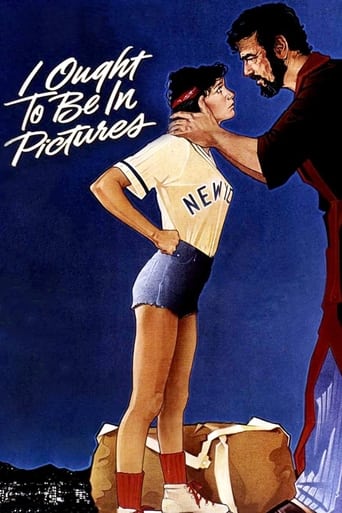lavatch
In 1982, Vincent Canby of The New York Times described "I Ought to Be in Pictures" as a film that "ought not to be." Popular television critic Gene Siskel chose "I Ought to Be in Pictures" as one of the worst films of the year. On his show, Siskel described the theme of the film in these words: "A smart alec daughter learning to accept a smart alec father." The preceding reviewers' comments demonstrate the inherent subjectivity involved in film criticism.The "smart alec" daughter is Libby Tucker, as played by the young actress Dinah Manoff. Manhoff had just won a Tony Award for her performance of the same role in the New York stage version of Neil Simon's play. In the film, Manhoff creates a textured, multi-layered interpretation of Libby Tucker. Her comic timing is superb, and she discovers the emotional depth of the character late in the film.The "smart alec" father is Herbert Tucker, who is played by one of the finest interpreters of Neil Simon's comedies and one of the most beloved stars of Hollywood, Walter Matthau. In interpreting Herb Tucker, Matthau's naturalism in the reading of Simon's often contrived one-liners is superb. And he hits all the right notes in the touching relationship of Herb and the daughter he has not seen in sixteen years.Herbert Ross brings a fine directorial touch in adapting Simon's stage play to the screen. There is some terrific location shooting in Los Angeles, including the Hollywood Park race track and Dodger Stadium. There was a picture-perfect selection of Herb Tucker's home at 1761 Vista Del Mar Avenue, in Hollywood—a residence with a distinctive red tile roof. That house is still standing and may be see in a google satellite map, virtually unchanged from the 1982 filming.It was a challenge to adapt a three-character play to the film medium. But this crisply paced and well-photographed film was undeniably a success. Ann-Margaret delivers a sensitive, understated performance as Steffy, who is involved in a romantic relationship with Herb. Other small roles, such as the two young men Libby meets are also spot-on.The beautiful scoring of the film is by Marvin Hamlisch, one of the most accomplished composers in both films and the American theater. The beautiful song "One Hello" recurs through the film's score, culminating at the end with a sensitive rendition by vocalist Randy Crawford.With the passing of over three decades "I Ought to Be in Pictures" is a film worthy of reconsideration. How many films today have this level of sophisticated comedy and are able to balance the humor with a heartfelt message? And how many have the chemistry of such outstanding performers as Walter Matthau, Dinah Manoff, and Ann-Margaret?
msdemos
Every once in a while, you watch a random film, and hours, days, weeks, a lifetime later, it's one you find you just never forget.This, for me, is one of those films.Flying under the radar, and IMMENSELY underrated, this one quietly showed up in 1982, and then seemed to be gone and forgotten about, by nearly everyone.Though it did have a video (vhs) release, criminally, it was never released on DVD.But now, the little film that could, is FINALLY available on DVD, as part of 20th Century Fox's Cinema Archives series.Maybe, just maybe, the rest of the world will now slowly catch on to this sneaky little gem of a movie, and find themselves remembering it hours, days, weeks.......or even a lifetime later.
moonspinner55
It must have been a casting no-brainer to put Dinah Manoff in the film-adaptation of Neil Simon's Broadway hit "I Ought To Be In Pictures" since she played the part of headstrong Libby on the stage. Unfortunately, a bombastic concoction such as Libby cannot be easily transferred to the more intimate medium of film, and the writing leaves both Manoff and the viewer at a complete loss. Neil Simon writes gag-dialogue, gag-characters, gag-situations, so when he tries to get serious--the audience doesn't know how to respond. Is this guy kidding again? Libby moves from Brooklyn to Los Angeles to reconnect with her estranged screenwriter father, ostensibly to break into movies but mostly because she needs a loving dad to hold her. These later scenes are so uncomfortable, so static, that poor Walter Matthau can only sit on the end of the bed and gape (I've never seen him at such a loss). Ann-Margret has a warm, grounded presence as Matthau's girlfriend (it's not much of a role, and the dialogue is still in Simon's one-note, but A-M manages to give this woman some soul). Manoff, looking and acting like a cross between Tatum O'Neal and Kristy McNichol, projects to the rafters, as if she were still on Broadway. She's Gussy Gumshun; and when the barriers come down and she's vulnerable, we would like to give her our sympathies, but Simon won't let us. He has already moved on, to the next limp gag. ** from ****
Cineman-32
This is a modest but affecting little film. Besides his gift for one-line zingers, Neil Simon has a way of giving his characters lines that are both surprising and believable. Dinah Manoff is perhaps a bit abrasively cooky at first, but she moderates the Brooklyn shtick after awhile and comes over as more complex and real. Walter Matthau as her bewildered but finally disarmed dad is consummately believable. Ann Margaret has little to do, but she does it with superb subtlety. Just watch how well she listens and understands



